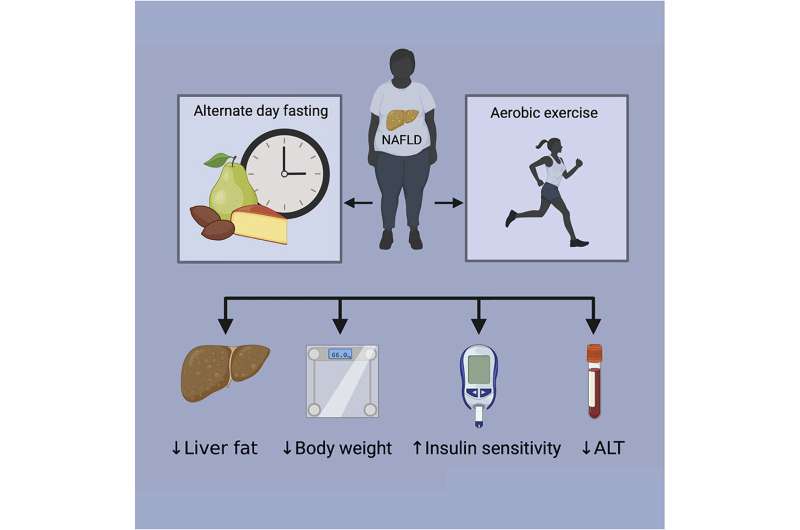This article has been reviewed according to Science X's editorial process and policies. Editors have highlighted the following attributes while ensuring the content's credibility:
fact-checked
peer-reviewed publication
trusted source
proofread
Alternate-day fasting could be a good option for patients with fatty liver disease

Nutrition researchers at the University of Illinois Chicago studied 80 people with nonalcoholic fatty liver disease and found that those who followed an alternate-day fasting diet and exercised were able to improve their health.
Publishing their findings in Cell Metabolism, the researchers report that over a period of three months people who exercised and alternated feast and fast days—eating without restriction one day and eating 500 calories or fewer the next—saw increased insulin sensitivity and decreased liver fat, weight and ALT, or alanine transaminase enzymes, which are markers for liver disease.
Nonalcoholic fatty liver disease is a buildup of fat and inflammation in patients who drink little to no alcohol. Approximately 65% of obese adults have the disease, and this condition is strongly related to the development of insulin resistance and Type 2 diabetes. If left unchecked, fatty liver disease can lead to more serious complications like cirrhosis or liver failure, but there are limited good drug options for treating the condition.
Study author Krista Varady called the findings "pretty amazing."
"When we compared the results of our study groups, we saw clearly that the most improved patients were in the group that followed the alternate-day fasting diet and exercised five days a week," said Varady, professor of nutrition at the College of Applied Health Sciences. "The people who only dieted or only exercised did not see the same improvements, which reinforces the importance of these two relatively inexpensive lifestyle modifications on overall health and on combating chronic diseases like fatty liver disease."
Participants in the clinical trial were randomized to one of four groups: an alternate-day fasting group, an aerobic exercise group, a combined group and a control group in which participants made no changes to their behaviors. Participants in the diet groups tracked their food intake and participants in the exercise groups used an elliptical machine in Varady's lab for one hour, five days a week.
Varady said the study did not test if alternate-day fasting was better or worse than other diets when combined with exercise, but she was surprised to see very few participants drop out of the study.
"Alternate-day fasting and exercise interventions can be difficult for people to stick to and in prior studies we have seen significant dropout. It was very interesting to see that in this trial we had very high adherence to the interventions," said Varady, who thought the study's implementation at the beginning of the COVID-19 pandemic in 2020 could be a plausible explanation for the variation.
In addition to seeing improved metabolic indicators, the study authors also noted there were no serious safety events during the trial—the patients were able to safely maintain the diet and exercise for the three-month study, which Varady thinks is an indicator the intervention may be a good option for people with fatty liver disease who want to improve their health without pharmaceuticals, which can have side effects.
In their paper, "Effect of alternate day fasting combined with aerobic exercise on non-alcoholic fatty liver disease: A randomized controlled trial," which is the first study to examine the effect of intermittent fasting combined with exercise on nonalcoholic fatty liver disease outcomes, the authors write, "Our findings also indicate that the combination intervention was effective for reducing body weight, fat mass, waist circumference, ALT, fasting insulin, insulin resistance, and increasing insulin sensitivity, among patients with obesity and NAFLD, versus controls."
More information: Mark Ezpeleta et al, Effect of alternate day fasting combined with aerobic exercise on non-alcoholic fatty liver disease: A randomized controlled trial, Cell Metabolism (2022). DOI: 10.1016/j.cmet.2022.12.001



















